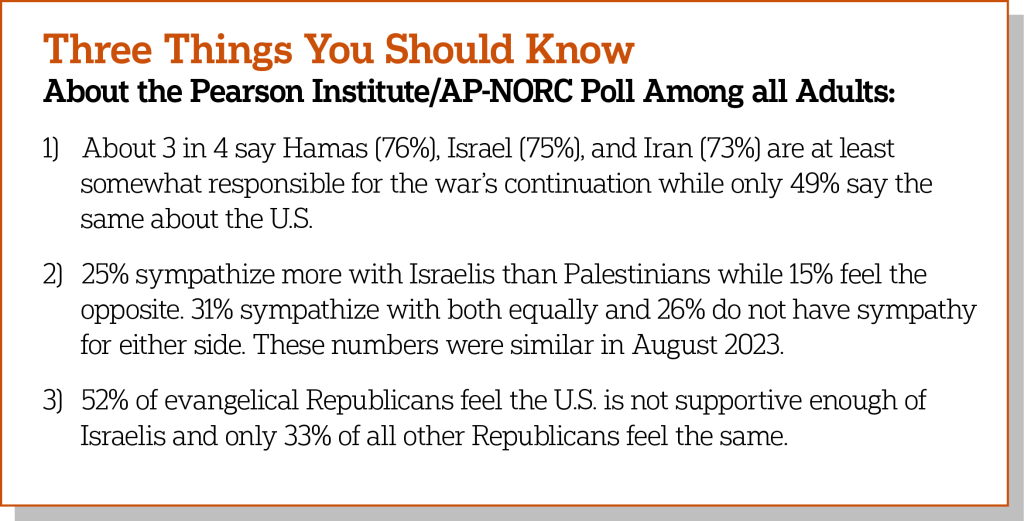
October 2, 2024
As the one-year anniversary of the deadly Hamas attacks on Israel on October 7th nears, the latest Pearson Institute/AP-NORC Poll shows that the public’s priorities for U.S. involvement remain focused on a few key foreign policy objectives. A majority say it is very important to recover hostages being held in Gaza by Hamas and about half believe it is important to negotiate a permanent ceasefire between Israel and Hamas. These priorities are very similar to a survey in November 2023.
The public spreads blame for the current situation across several entities. About 3 in 4 say that the Israeli government, the Palestinian group Hamas, and the Iranian government are each at least somewhat responsible for the continuation of the fighting.
Many public attitudes toward the conflict have remained relatively stable, but there have been some shifts in opinion over the past year. Israel is more likely to be seen as an ally than it was in August 2023 before the attacks (40% vs. 32%). The public is also more supportive of the establishment of an independent Palestinian state now (29% vs. 22%).
There are significant differences in attitudes toward the Israelis, Palestinians, and the conflict based on political partisanship, religion, and age.
For example, more Republicans than Democrats (46% vs. 10%), more evangelical Christians than other adults (42% vs. 20%), and more adults age 45 and older than younger adults (31% vs. 18%) sympathize more with the Israelis than the Palestinians
And there are significant differences within the partisans. Older Democrats tend to be more supportive of Israel than younger Democrats and evangelical Republicans are more sympathetic of Israelis than other Republicans.
There are also partisan differences regarding the war between Ukraine and Russia. Democrats are more likely than Republicans to view Russia as an adversary and Ukraine as an ally. Views on U.S. spending on the war have shifted over the past year, as fewer people think the United States is spending too much in Ukraine compared with last October (34% vs. 52%).

The nationwide poll was conducted by the Pearson Institute for the Study and Resolution of Global Conflicts and The Associated Press-NORC Center for Public Affairs Research from September 12 to 16, 2024, using AmeriSpeak®, the probability-based panel of NORC at the University of Chicago. Online and telephone interviews using landlines and cell phones were conducted with 1,111 adults. The margin of sampling error is +/- 4.0 percentage points.
Suggested Citation: AP-NORC Center for Public Affairs Research. (September, 2024). “Public Opinion of the Israel and Hamas Conflict Nearly a Year After the October 7th Attacks” https://apnorc.org/projects/public-opinion-of-the-israel-and-hamas-conflict-nearly-a-year-after-the-october-7th-attacks/








